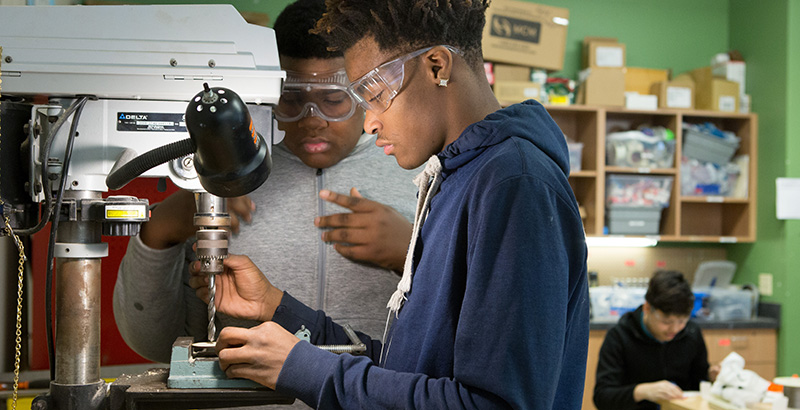North Carolina Business Leaders Celebrate State’s Work-Based Learning Programs

Get stories like this delivered straight to your inbox. Sign up for The 74 Newsletter
Tech teams, early childhood education certificates, and a fast-track to nursing — these are just some of the programs that took the spotlight at the North Carolina Business Committee for Education’s (NCBCE) annual meeting. This year, the event highlighted successful work-based learning programs in schools across the state.
Work-based learning, from career and technical education (CTE) classes to apprenticeships, is an education strategy that allow students to learn while doing.
Gov. Roy Cooper said work-based learning not only helps students experiment with what they want to do for their career but also helps businesses develop a future workforce.
“Sometimes young people think they may or may not want a job, but they really don’t know what it’s like,” he said. “Work-based learning allows you as a student to go and give it a shot.”
Crystal Folger-Hawks, program director at Surry-Yadkin Works, said these kinds of programs are essential to the future of the workforce.
While students are in high school, she said, educators and industry professionals have a real opportunity to shape their future.
“I can’t control once they’ve graduated high school, but I can control before they graduate high school… I can make sure I open their eyes to what’s available to them in their local community when it comes to workplace readiness,” she said. “To me, it’s dire.”
Here’s a look at some of the featured programs.
‘Building our own Geek Squad’
For Halifax County Schools Superintendent Eric Cunningham, getting 800 new Wi-Fi hotspots at the start of the pandemic wasn’t good enough.
“When we talk about all roads leading to student achievement,” he said, “what we really wanna do is, how do we impact teaching and learning at the same time while bridging the digital divide?”
The district only had two techs, so he was hesitant to invest in hundreds of new computers without the capacity to repair them. For his district, the answer was creating a new CTE program.
“We’re building our own Geek Squad in Halifax County,” he said.
Under the Tech Team program, students can take courses on fixing computers at the same time as students are using them for school.
NCBCE used CARES Act funding to launch this kind of student tech help desk program across 11 school districts in the eastern part of the state. In addition to providing funding to get these programs started, NCBCE also helped develop the curriculum and provided professional development for teachers.
During the last year, Halifax County Schools was able to repair 500 computers using the program.
“When you’re in a small rural town like Halifax, our kids just aren’t exposed to a lot of options and opportunities,” Cunningham said. “So when we started the help desk program, it just illuminated them in such a way that they could now see that they could become computer engineers.”
In Onslow County, the Eastern North Carolina Regional Skills Center is another route districts can take to set up work-based learning programs.
The center allows students to take classes in “high-value, in-demand career pathways,” such as robotics and automotive repair. Students work hands-on fixing cars, assembling robots, and even building houses.
Amelia Weber, a game design student, said she feels the center gives her a leg up.
“These programs help you excel a lot to help you find your footing for your career so you have the experience, and you’re ahead of the game more so than people who didn’t have the experience,” she said.
Olachi Anaemereibe, project manager at Daniele Company in Durham County and a partner with the skills center, said working with these young students provides a unique value to her company. They have new ideas and aren’t necessarily tied to the way things have always been done, she said.
“Because our world is constantly changing, it’s always good to have a young person in that seat to be able to contribute in that kind of way,” she said.
Youth apprenticeship programs
Students in school districts across the state are able to get career experience through youth apprenticeships, particularly in fields that are facing staffing shortages.
In Surry County, the local school districts, Surry Community College, and Northern Regional Hospital have partnered to create a program where students can become a Certified Nurse Assistant.
In McDowell County, a similar program allows high school students to earn credentials in early childhood education.
For the companies and students, they say it’s a win-win situation. The companies are able to train a potential future workforce, and the students get this education for free.
Karey Dulaney, Head Start director for McDowell County Schools, said they realized they needed to start earlier if they were going to address teacher staffing issues. The students who come out of this program, she said, are much more prepared for what the career actually entails.
“They’ve had the opportunity to be in the classroom and work with the students and see the daily routines,” she said. “They’ve had the opportunity to see how hard and how difficult this career can be.”
Students take two courses and work at the child care center three days a week for three hours before they are able to get their certification. They said the times when they’re interacting in-person with the children are important because they are able to apply what they learn in class.
Kassidy Rose, a student at McDowell High School, said this program has been a relief for her because she’s able to take classes and work without having to worry about cost. Originally, she said she wasn’t sure if she would even be able to go to college.
To Superintendent Catherine Truitt, all of these programs get at the heart of what a student’s K-12 experience should do: prepare them for their future, no matter what they want to do.
“The more we can help students figure out, while they’re still in middle or high school, what their passions are, the more easily we can create these opportunities,” she said.
To learn more about these programs and others featured during NCBCE’s annual meeting, watch the full recording here.
This article first appeared on EducationNC and is republished here under a Creative Commons license.
Get stories like these delivered straight to your inbox. Sign up for The 74 Newsletter

;)